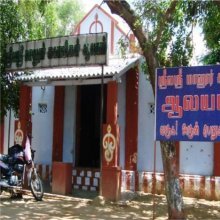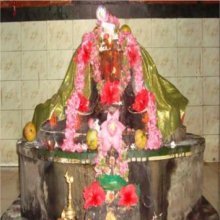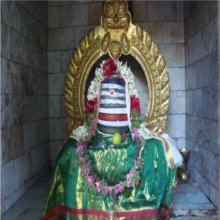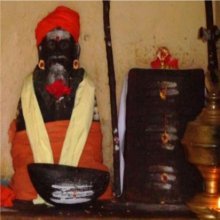Siddhar: 3 definitions
Introduction:
Siddhar means something in Hinduism, Sanskrit, the history of ancient India. If you want to know the exact meaning, history, etymology or English translation of this term then check out the descriptions on this page. Add your comment or reference to a book if you want to contribute to this summary article.
Images (photo gallery)
(+20 more images available)
In Hinduism
Shaivism (Shaiva philosophy)
Source: Wikipedia: ShaivismThe Siddhar refers to intellectual people in Tamil language, from ancient Tamilakam, and was written only in Tamil language. Typically Siddhars were saints, doctors, alchemists and mystics all in one. The siddhars are believed to have had both major and minor powers which are described in detail in various yogic and religious texts.
Siddhars wrote their findings in the form of poems in the Tamil language, on palm leaves which are collected and stored in what are known as the “Palm leaf manuscripts”. In this way Siddhars developed, among other branches of a vast knowledge-system, what is now known as Siddha medicine, practised mainly in Tamil Nadu as a type of traditional native medicine.
There are 18 siddhars in the Tamil Siddha tradition. They are:
- Nandeeswarar (Nandidevar or Nandi)
- Tirumular
- Agathiyar
- Kalangi Nathar
- Pathanjali
- Korakkar
- Pulipaani
- Konganar
- Sattamuni
- Theraiyar
- Ramadevar
- Siva vaakiyar
- Edaikkadar
- Machamuni
- KaruvoorarThevar
- Bogar
- Pambatti (Pambatti Siddhar)
- Kuthambai

Shaiva (शैव, śaiva) or Shaivism (śaivism) represents a tradition of Hinduism worshiping Shiva as the supreme being. Closely related to Shaktism, Shaiva literature includes a range of scriptures, including Tantras, while the root of this tradition may be traced back to the ancient Vedas.
Shilpashastra (iconography)
Source: Shodhganga: The significance of the mūla-beras (śilpa)Siddhar is the name of deity as found depicted in the Meenakshi Temple in Madurai (or Madura), which represents a sacred place for the worship of The Goddess (Devī).—Siddhar is represented as seated in sukhāsana with two hands, the right in abhaya and the left in nidrā-hasta resting on the mace. In dancing form, he is represented with the right hand in patāka-hasta and the left hand in dolā placed on the gadā (mace).

Shilpashastra (शिल्पशास्त्र, śilpaśāstra) represents the ancient Indian science (shastra) of creative arts (shilpa) such as sculpture, iconography and painting. Closely related to Vastushastra (architecture), they often share the same literature.
India history and geography
Source: DSpace at Pondicherry: Siddha Cult in Tamilnadu (historical)Siddhar means perfected or realized saint. The terms Siddhas, Siddhar, Sittar and Cittar were variously used by the Western and Indian scholars, but each of them has specific connotation in Tamil.
The word Siddhar is found in the literary work Tirumandiram. The Siddhar of this period is entirely different from the Siddhar of the later period in different aspects. However, the word is not found in the Nikaṇdus, except Piṅgalanthai. Evidently such group must have originated only after the Nikaṇḍu period i.e. 13th-14th centuries. Even Agarāthi, Abidhana, Vadamālai nikaṇḍus of 19th century too do not mention the word ‘Siddhar’.

The history of India traces the identification of countries, villages, towns and other regions of India, as well as mythology, zoology, royal dynasties, rulers, tribes, local festivities and traditions and regional languages. Ancient India enjoyed religious freedom and encourages the path of Dharma, a concept common to Buddhism, Hinduism, and Jainism.
See also (Relevant definitions)
Starts with (+17): Siddharaj, Siddharaja, Siddharajavarnana, Siddharangakalpa, Siddharasa, Siddharasadanda, Siddharasatirtha, Siddharasaveda, Siddharasayana, Siddharatna, Siddharatri, Siddhari, Siddharicakra, Siddharicakranirnaya, Siddharikoshthaprakara, Siddharkadu, Siddharmalai, Siddharshi, Siddharth, Siddhartha.
Full-text (+19): Siddha, Kanjamalai, Kaduveli, Kailasanatha, Uromarishi, Sattaimuni, Konganar, Bogar, Macchamuni, Brahmamuni, Agastya, Kunkannar, Kurmamuni, Sundaranandar, Nandi, Tirumular, Vasamuni, Kamalamuni, Punnakkisar, Appupillaiyur.
Relevant text
Search found 3 books and stories containing Siddhar; (plurals include: Siddhars). You can also click to the full overview containing English textual excerpts. Below are direct links for the most relevant articles:
Subramania Bharati's Prose-Poetry < [January – March, 1982]
Book Reviews < [April – June, 1990]
Early Chola Temples (by S. R. Balasubrahmanyam)
Temples in Tirunaraiyur < [Chapter VIII - Temples of Uttama Chola’s Time]
Preceptors of Advaita (by T. M. P. Mahadevan)





